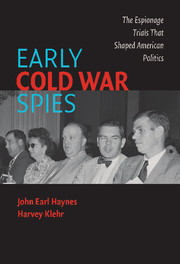Book contents
- Frontmatter
- Contents
- Series Editor's Foreword
- 1 Introduction: Early Cold War Spy Cases
- 2 The Precursors
- 3 Elizabeth Bentley: The Case of the Blond Spy Queen
- 4 The Alger Hiss–Whittaker Chambers Case
- 5 The Atomic Espionage Cases
- 6 Judith Coplon: The Spy Who Got Away with It
- 7 The Soble-Soblen Case: Last of the Early Cold War Spy Trials
- 8 Conclusion: The Decline of the Ideological Spy
- Index
- References
7 - The Soble-Soblen Case: Last of the Early Cold War Spy Trials
Published online by Cambridge University Press: 05 June 2012
- Frontmatter
- Contents
- Series Editor's Foreword
- 1 Introduction: Early Cold War Spy Cases
- 2 The Precursors
- 3 Elizabeth Bentley: The Case of the Blond Spy Queen
- 4 The Alger Hiss–Whittaker Chambers Case
- 5 The Atomic Espionage Cases
- 6 Judith Coplon: The Spy Who Got Away with It
- 7 The Soble-Soblen Case: Last of the Early Cold War Spy Trials
- 8 Conclusion: The Decline of the Ideological Spy
- Index
- References
Summary
The spy trials of the late 1940s and early 1950s focused on the theft of sensitive government information. Top secret documents, atomic espionage, and military technology had been stolen. The accused had held important government positions with knowledge of internal U.S. policy deliberations or had access to highly sensitive technological and military secrets, and the public was transfixed by the trials and their aftermath. The spy cases of the latter half of the 1950s drew less attention. The defendants had little to do with stealing significant government secrets, although that was not for lack of trying and in part reflected successful American counterespionage. Instead, the spies in the last cases had chiefly participated in the Soviet Union's clandestine campaign to suppress or discredit exiled Russian dissidents and other ideological enemies of the USSR. In many cases their actions were not strictly illegal under American law of that day but several of those involved had the blood of dissident Russians on their hands. And like the Rosenberg case, the Soble-Soblen spy trials featured siblings turning on each other.
Jack Soble, Robert Soblen, and their confederates were tried for espionage against the United States, but the history of their apparatus goes back to Europe and Joseph Stalin's rivalry with Leon Trotsky. A brilliant writer and Marxist theoretician, Trotsky became one of the Bolshevik heroes of the Russian Revolution by organizing the Red Army into an efficiently merciless military force and leading it to victory in the Russian Civil War.
- Type
- Chapter
- Information
- Early Cold War SpiesThe Espionage Trials that Shaped American Politics, pp. 208 - 229Publisher: Cambridge University PressPrint publication year: 2006

